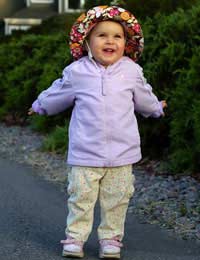The Language of Toddlers and Pre-Schoolers

As a child grows he or she develops and expands the ‘vocabulary’ of body language. New behaviours can emerge seemingly overnight, and old behaviours can take on entirely new meanings. Perhaps the most dramatic changes occur during the toddler and preschool years, when children go through the process of mastering verbal communication.
Common Body Language of Toddlers
Let’s start with a look at toddlers and the typical body language they use. Because words are not a very good option at this point, body language is used almost continuously. Examples of such behaviours include:- Reaching out a hand
- Pointing
- Touching
- Making eye contact
- Shaking or nodding the head
- Pushing something or someone away
- Pulling something or someone closer
Body language is also a powerful indicator of a toddler’s comfort level with a particular situation. Think about a group of toddlers in a play area, and you can easily picture some playing happily, some engaged in conflict with each other, and one or two hanging back and not participating at all. It’s easy to imagine those hanging back being uncomfortable in the groups, but those involved in conflicts are often just as uncomfortable. They simply express their discomfort by becoming very assertive rather than very submissive.
Common Body Language of Preschoolers
Preschoolers typically display most of the same non-verbal behaviours as toddlers, but they expand the meaning of these messages even further by adding in words. Examples of this include:- Pointing to a toy and asking to play with it rather than grabbing it
- Approaching someone who is hanging back and inviting him or her to come play
- Pushing and name calling
- Hugs and squealing
- Exaggerated pouting, accompanied by indignant words
One of the most common occurrences in these early preschool years is attempting to tell a lie. This may seem like a small thing, but it has huge implications for the years to come. When a child first attempts lying with words, body language almost inevitably gives them away. They have trouble making eye contact, they may hang their head, or otherwise appear tentative.
From First Words to Full Sentences
As a child moves from first words to full sentences, his or her body language undergoes tremendous changes as well. During infancy the primary means of communication is body language and non-verbal cues, and most toddlers have developed an amazing array of non-verbal vocabulary. When words start to emerge, however, it is a confusing time for the child and it’s easy for frustration to set in.For instance, a child might be trying to say a particular word, but nearby adults can’t quite make it out. The child knows what he or she is saying, though, and irritation levels quickly escalate. A child’s body language often takes over at that point, whether in the form of crying, pouting, hitting, or some other expression of aggravation and frustration.
This is a very challenging time for parent and child alike, requiring a great deal of patience and understanding. Parents can make the process easier for everyone by avoiding situations where frustration might occur (missing a nap, becoming over stimulated, unfamiliar and frightening circumstances) and being prepared to redirect the child’s attention if aggravation sets in. Redirection might include keeping a favourite book on hand, or a small colouring book with crayons – anything that can quickly and easily capture a child’s attention and move it away from the communication problems.


Re: Changing Gender Roles
(palimpsests). In the XIII-XV centuries in
Re: Asperger's Syndrome and Learning Body Language
I have a son that has Aspergers. I believe in the concept of learning body could help these people. I also…
Re: Body Language Questionnaire: How to Tell If Someone Likes You
I strongly recommend Leonardomitnickhacking@gmail. com to you all. He can help you to…
Re: If a Person Sits on One Leg, What Does This Mean?
No deep psychological reason for using this position. Im 4'10". Hate my legs dangling. It cuts my…
Re: Body Language of an Abuser
Totally agree with the other poster. And truly, "Perhaps if women were more aware of these indicators, abuse statistics could be…
Re: The Role of Body Language in Communication
People do not respond or react towards other people body language. We sometimes take it the wrong way when…
Re: What Do Nail Biting & Hair Twirling Reveal?
I have a very bad habit of twirling my hair, putting it in my mouth and bitting my hair off. Iv had this…
Re: Communication - What Percentage is Body Language?
i have big problem with body language and choice of my words, so i decided to listen first and then…
Re: What Do Nail Biting & Hair Twirling Reveal?
I have twisted my hair for years as had my grandmother, mother before me and now my daughter, and my…
Re: Communication - What Percentage is Body Language?
this sounds interesting and I need tips and tricks of body language. I want to get more informed in…